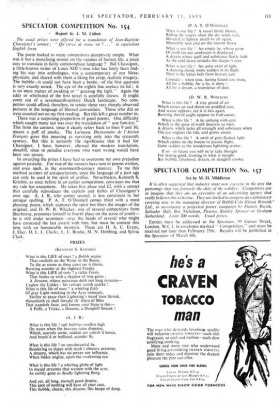SPECTATOR COMPETITION No. is4
• Report by J. M. Cohen The usual prizes were offered jar a translation of Jean-Baptiste Chassignet's sonnet ; " Qu'est-ce de noire vie ? ..." in equivalent English form.
The poem looked to many competitors deceptively simple. What was it but a moralising sonnet on the vanities of human life, a piece easy to translate in fairly commonplace language ? But Chassignet, nlittle-known writer of Louis XIII 's time who has lately been find- k ing his way into anthologies, was a contemporary of our Meta- physicals, and shared with them a liking for crisp, realistic imagery. The bubble—it could not have been a bottle—of the first quatrain is very exactly noted. The eye of the eighth line unglues its lid ; it is no mere matter of awaking or " greeting the light." Again the eddy or whirlwind of the first tercet is carefully drawn. It might come out of a seventeenth-century Dutch landscape. No com- petitor could afford, therefore, to render these very sharply observed pictures in the language of blurred convention. Those who did so were counted out on my first reading. But this left a great number in.
There was a surprising proportion of good poems. One difficulty which caught many out was over the translation of une fum.ere." This from the context, since it clearly refers back to lines 9 and 10, means a puff of smoke. The Larousse Dictionnaire de l'Ancien Francais gives this meaning as surviving only into the sixteenth century. But this is certainly the significance that it had for Chassignet. I have, however, allowed the modern translation, dunghill, since to penalise everyone who went wrong would have been -too severe.
In awarding the prizes I have had to overcome my own prejudice against pastiche. For two of the winners have sent in poems written, and even spelt, in the seventeenth-century manner. To me this method savours of antiquarianism, since the language of a past age can only be used in the spirit of artifice. Nevertheless, Kenneth S. Kitchin, as once before in an earlier competition, convinces me that my rule has exceptions. He takes first place and £2, with a sonnet that carefully reproduces the capitals and italics of Chassignet's own age. A. J. B., who comes second, is less consistent in her antique spelling. P. A. T. O'Donnell comes third with a most pleasing poem, which captures the spirit but blurs the images of the original, and D. W. R. Whicker, one of several competitors from Sherborne, promotes himself to fourth place on the score of youth— he is still under seventeen—over the heads of several who might have contested the last award with him, but must be content this time with an honourable mention. These are H. A. C. Evans, J. Eker, D. L. L. Clarke, L. E. Brodie, M. N. Dobbing, and Sylvia Clark.
PRIZES •
(KENNETH S. K1TCHIN)
What is this LIFE of ours ? a Bubble weake That swelleth on the Water in the Raine, To die as soone as thou canst see it plaine, Bursting asunder at the slightest Freake. What is this LIFE of ours ? a tickle Tricke That fooles us with a shadow of true gaine ;
A Dreame, whose puissance doth not long remaine-
Unglew thy Liddes : his vertues vanish quicke
What is this life of ours ? a whirling Eddy
Or gray Light mocking in the Ayre unsteady, Swifter to passe than Lightning's murd'rous Stroak.
Henceforth ye shall forsake th' Idaea of Bliss That standeth faste, and knowe your State is this—
A Puffe, a Tricke, a Dreame, a Dunghill Smoak 1
(A. J. B.) What is this life ? soft bubbles swollen high On water when the heavens raine dispense, Which, scarcely seene, sudden are vanish'd hence, And brush'd or buffeted, asunder fly.
What is this life ? an unsubstantial lie, Rendering us dupes with truth's obscure pretense, A dreame, which has no power nor influence, When liddes unglue, upon the awakening eye.
What is this life ? a whirling globe of light In mazed streames that wanton with the ayre, As swiftly gone as deadly lightning flung.
And yet, all long, eternall good despite, This spot of nothing will have all your care, This bubble, cheate, this dreame, this heape of dung.
(P. A. T. O'DONNELL)
What is our life ? A vessel thinly blown, Riding the waters when the sky sends rain, Shivered at lightest touch to air again, Momently seen and on the instant flown.
What is our life ? An empty he, whose guise Of truth for our confusion is displayed ; A dream whose spell and substance fleetly fade As the cold dawn unlocks the sleeper's eyes.
What is our life ? An antic swirl of light. A dancing cloud, more sudden in its flight Than is the lethal bolt from heaven cast.
Consider ; when true, lasting Good you shun, All for a bubble, for a lie, is done— All for a dream, a transience of dust.
(D. W. R. WHICKER) What is this life ? A tiny gourd of air Which tosses up and down on puddled rain, And scarce appears, ere it is lost again, Bursting should ought oppose its frail career.
What is this life ? A lie unhung with care Which in the guise of truth deceives us men, A dream, which lacks all strength and substance when The eye unglues the lids, and grows aware.
What is this life ? A swirl of grey-flecked light Which eddies on the breeze in joyous flight, Gone sudden as the murderous lightning stroke.
If so—in future you will ne'er take thought For lasting good, trusting in what is nought But bubble, falsehood, dream, or dunghill smoke.


































 Previous page
Previous page